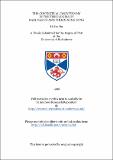Files in this item
The contextual 'cognitio dei' in the theologies of Karl Barth and Choan-Seng Song
Item metadata
| dc.contributor.advisor | Hart, Trevor A. | |
| dc.contributor.author | Ou, Li-Jen | |
| dc.coverage.spatial | i, 358 p. | en_US |
| dc.date.accessioned | 2018-06-08T14:51:10Z | |
| dc.date.available | 2018-06-08T14:51:10Z | |
| dc.date.issued | 1999-07 | |
| dc.identifier.uri | https://hdl.handle.net/10023/13858 | |
| dc.description.abstract | The major tasks of the present thesis are twofold: First, to show through a historical and material reconsideration of Karl Barth’s doctrine of the knowledge of God, the falsity of three prevalent misreadings of his work—that Barth denies God’s capacity for making Himself known through nature, that he finally makes a concession to natural theology, and that Barth’s theology as a whole is acontextual and takes little account of earthly conditions. Second, to consider the significance of Barth’s actual teaching for the Taiwanese context by hosting a dialogue between his thought and the so-called ‘Asian theology’, with particular emphasis on the theology of the Taiwanese theologian Choan-Seng Song. Firstly, the thesis argues that in regarding natural theology as a form of pernicious teaching, which declares that human beings as such possess the capacity and power to conceive God, the world and humanity, Barth wishes to safeguard against Christ’s universal sovereignty in freedom being trivialised. Secondly, it accentuates that Barth’s preference for revealed knowledge of God is meant to disclose the universal love in and of Christ which renews corrupted humanity in the act of reconciliation. While Barth has no doubt that this love penetrates into human culture and nature, making use of them as media in witness of God outside of the sphere of Christ and the Church, he never makes any concession to natural theology at the expense of Christ, i.e., of Christian faith. On balance, Barth’s doctrine of the knowledge of God is from beginning to end Christocentric in view of highlighting Christ as the centre. Through a historical reading of Barth the thesis in turn seeks to establish a constructive dialogue between Barth and Song whose thought deeply influences the Presbyterian Church in Taiwan. It lays bare the hidden dangers of Asian theology and Song’s anthropocentric knowledge in order to encourage Taiwanese Presbyterians to continue to consider an alternative approach (consonant with Barth’s) to maintaining their Christian identity in a culture that is encompassed by a religiously pluralist atmosphere and a secular humanitarian ethos. | en |
| dc.language.iso | en | en_US |
| dc.publisher | University of St Andrews | |
| dc.subject.lcc | BT101.B2O9 | en |
| dc.subject.lcsh | Barth, Karl, 1886-1968 | en |
| dc.subject.lcsh | Song, Choan-Seng, 1929- | en |
| dc.subject.lcsh | God (Christianity)—Knowableness | en |
| dc.title | The contextual 'cognitio dei' in the theologies of Karl Barth and Choan-Seng Song | en_US |
| dc.type | Thesis | en_US |
| dc.contributor.sponsor | Tainan shen xue yuan | en_US |
| dc.type.qualificationlevel | Doctoral | en_US |
| dc.type.qualificationname | PhD Doctor of Philosophy | en_US |
| dc.publisher.institution | The University of St Andrews | en_US |
This item appears in the following Collection(s)
Items in the St Andrews Research Repository are protected by copyright, with all rights reserved, unless otherwise indicated.

